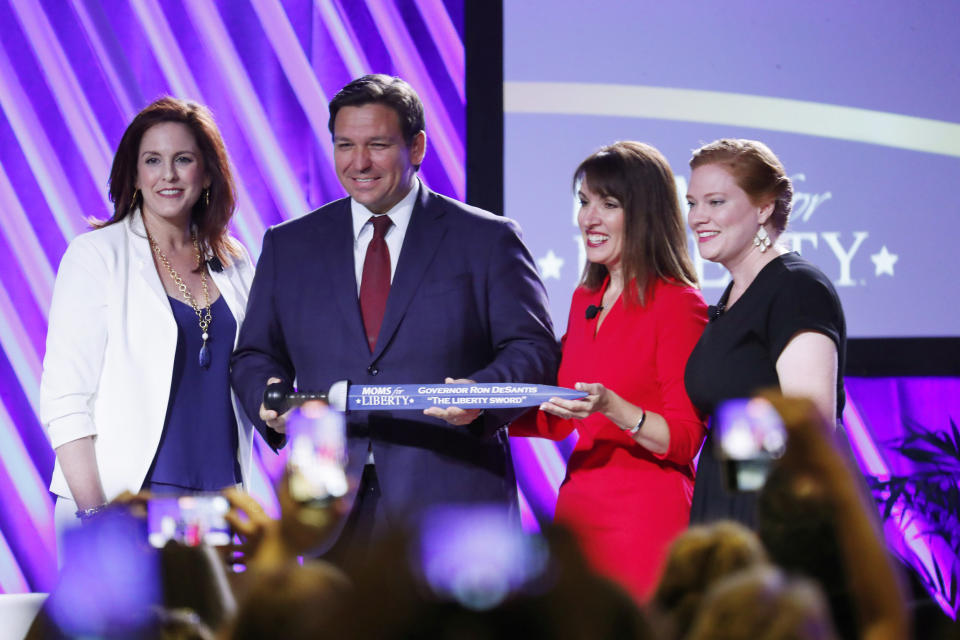Liberals push back on Republican activism in school board elections
Liberal parents concerned about the right’s increased focus on school board elections are ready to fight back — but they face obstacles in fundraising and organizing, with little national support.
Over the past year, dozens of progressive activist organizations and political action committees have launched or reoriented themselves to counter conservatives who have brought the fight over culture war issues to school board races.
These liberal groups — including Red, Wine & Blue, a national effort; the Florida Freedom to Read Project, which two Florida mothers formed to combat book bans; and Defense of Democracy, started by two mothers in Fishkill, New York, who were unsettled by what they saw as Christian nationalists targeting school boards — have begun endorsing candidates, distributing campaign signs and training parents to speak out in support of diversity programs, transgender accommodations and books about racial conflicts and LGBTQ issues.
But in contrast to the conservative parent groups that quickly attracted support from prominent Republican politicians, think tanks and TV commentators, these left-leaning parents have received little national political backing. High-profile Democrats and many progressive organizations have largely avoided wading into the increasingly heated debates over policies and lessons on race and gender in schools.
That’s left the work of organizing to liberal parents who are still learning how to be activists — and in many cases they’re struggling to catch up with their better-organized opponents, according to policy analysts and political consultants.
“It is like drops in a bucket compared to what the Republicans are running,” said Amanda Litman, a Democratic campaign strategist and co-founder of Run for Something, which supports first-time progressive candidates, one of the few national organizations providing strategic guidance and training to people running for school board seats.
“It’s not even apples to apples,” Litman added. “It’s like apples to apple seeds.”
In Orlando, the two mothers who were upset by efforts to remove books from schools started the Florida Freedom to Read Project in November. They’ve endorsed 11 school board candidates this year, and Jen Cousins, a co-founder of the project and mother of a nonbinary child, said she’s canvassed every weekend since July.
But she’s frustrated. She feels outgunned by Moms for Liberty, a conservative activist group that started in Florida and has established 195 chapters in 37 states over the past year. Moms for Liberty has support from Republicans like Gov. Ron DeSantis, who headlined the group’s first national gathering in July and endorsed 30 school board candidates himself. And the organization’s political action committee has given $250 donations to 56 campaigns in Florida, in addition to $21,000 for digital outreach to a firm run by a top official in the Florida Republican Party, campaign finance records show.
The Freedom to Read Project, in contrast, has raised less than $10,000 this year through small donations, first as a political action committee and then as a nonprofit, Cousins said.
“There’s going to be more book bans, there’s going to be a broader pushback and they’re going to demonize LGBTQ-plus kids more than they already have,” Cousins said. “It’s an absolute right-wing radicalization of public education, and their mission is to make public education fail.”

The Florida Democratic Party noted it has had a Municipal Victory Program since 2016 that includes efforts to fundraise and help school board candidates. A spokesperson added that out of 37 candidates endorsed by the party chairman, Manny Diaz, 10 won outright in August, and another 20 are headed to a runoff in November. DeSantis fared better in his endorsements: Out of the 30 school board candidates he endorsed, 20 won in August, and five are headed to a runoff next month.
Historically, it hasn’t taken a lot of cash to influence school board races, which are generally nonpartisan and often draw low voter turnout. In a 2018 survey, just 9 percent of school board officials reported spending more than $5,000.
But that’s beginning to change. Republicans in GOP-controlled states, including Florida and Texas, declared school boards to be the new battleground where they planned to spend time and resources. Patriot Mobile, a Texas-based cellphone company, pumped $600,000 into local races to help conservatives sweep school board seats in the Fort Worth suburbs. Even in solidly blue states like California, the political action committees Reform California and Inland Empire Family and the Christian advocacy group American Council have spent months recruiting, training and promoting candidates for school board seats.
On a broader scale, the 1776 Project PAC, launched in May 2021 by writer and Republican campaign consultant Ryan Girdusky, has spent $1.2 million so far this year supporting conservative school board candidates, according to campaign finance records. Girdusky said the PAC has endorsed 113 candidates nationwide.
While the political rancor of recent school board races is a shift, Girdusky notes that schools have long been the subject of disputes over prayer, the Pledge of Allegiance and textbook content. Until recently, though, conservatives have focused more on school choice than on what children are learning in public schools, he said.
“This is the opportunity, I think, for parents to really argue conservative principles across the spectrum and have large appeal in a way that Republican politicians haven’t,” Girdusky said.
Litman said Democrats who cede school board races to Republicans are missing a significant political opportunity. School board members who campaign aggressively can use the email lists of their supporters to back other candidates or leverage their own ambitions for higher office, she said. They can also become more prominent and connected in their own communities and can serve as surrogates for candidates seeking statewide or federal positions.
“What Ron DeSantis is doing in Florida — supporting a bunch of these school board candidates — is really smart, because the No. 1 allies you’re going to need when he tries to run for something else is lots and lots of local leaders who are plugged in with their neighbors and their friends who can advocate on his behalf,” she said. “That’s a school board member.”

Tina Descovich, co-founder of Moms for Liberty, pushed back on the idea that liberals are the underdogs in local races, noting the influence of well-funded teachers unions. Moms for Liberty has endorsed nearly 200 candidates across the country but so far has only donated to school board contenders in Florida, Descovich said.
“We are so much like David,” going up against Goliath, she said. “We don’t have hundreds of millions of dollars. We have no money that we’re pouring into candidates nationwide yet — we hope to get there one day.”
The unrest roiling public schools began two years ago as parents became frustrated with school shutdowns during the pandemic. As schools resumed in-person learning, conservative parents began protesting other issues, complaining about diversity initiatives and accommodations for transgender students and demanding that some books with LGBTQ characters or that referred to sexual situations be removed.
“There were lots of very legitimate reasons to worry about school shutdowns,” said Jon Valant, director of the Brown Center on Education Policy at the Brookings Institution, a think tank. “And basically, Republicans have taken advantage of that, of that frustration, and channeled it in a bunch of different directions. And Democrats just have not countered any of that.”
Valant said education has historically been a winning issue for Democrats, particularly when school funding, teacher pay and school safety have been the focal points. However, multiple polls this year found voters had more confidence in Republicans than Democrats when it came to schools.
Some of the liberal efforts to push back against conservatives in school board races are well established. Red, Wine & Blue, which has raised $56,000 through its political action committee since it was created in 2019, recently pivoted from mobilizing suburban women to vote for Democrats to focus more on school board races. The group distributed a “parent playbook” and held virtual training sessions — attended by as many as 1,000 people, with cameos by Julia Louis-Dreyfus and Amy Schumer — to teach “mainstream moms” how to recruit and promote school board candidates.
“It seemed like something that was clearly a huge concern for women in our community,” said Katie Paris, the Ohio-based political consultant who started Red, Wine & Blue. “And they needed support, and they weren’t finding that elsewhere.”

But other groups are smaller.
In Michigan, Becky Olson co-founded Support Forest Hills Public Schools, with a core volunteer group of 20 parents, in October 2021 to push back against conservatives who’ve been trying to oust school board members — first by a failed recall effort, and now through the November elections — over complaints about a bus driver shortage and lessons on race and gender.
Support Forest Hills Public Schools endorsed three school board candidates among a field of 13 vying for four open seats. Olson estimates that her coalition has distributed 250 yard signs, hung 5,000 flyers on doors, written hundreds of postcards and spent over $1,000 on Facebook ads to drum up support for the three candidates that the group said will uphold a “tradition of nonpartisanship” in education.
“We don’t want to be politicians, we do not want to be running political campaigns for candidates — we’d much rather make sure that our students have a funded school district, that our educators are supported, and that things that matter are actually brought to the table,” Olson said.

The group’s biggest competition in the crowded field is a slate of candidates backed by local conservative activist groups, including a Moms for Liberty chapter, an organization that opposes mask and vaccine mandates and another one whose leaders have appeared at campaign events alongside Tudor Dixon, the GOP nominee for governor in Michigan. Dixon has campaigned on promises to keep discussions of sexual and gender identity out of K-12 classrooms.
Olson and her three co-founders got the idea for their political action committee from the Coalition to Support MTSD, a group formed in Mequon, Wisconsin, to counter protests over Covid safety protocols and discussion of racial issues in public schools. Olson’s group has in turn inspired and shared materials with residents starting similar efforts in nearby Michigan towns such as Grandville and Lowell.
“We know we are at a disadvantage being on the defense,” Olson said, “but we have to do this for our kids and educators.”
This article was originally published on NBCNews.com

